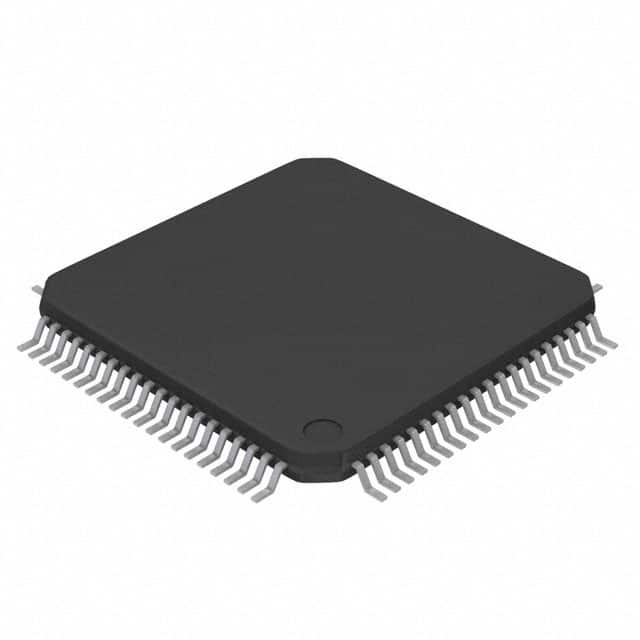PIC18LF8525T-I/PT
Product Overview
Category
The PIC18LF8525T-I/PT belongs to the category of microcontrollers.
Use
This microcontroller is commonly used in various electronic devices and embedded systems for controlling and processing data.
Characteristics
- High-performance 8-bit architecture
- Flash memory for program storage
- Low power consumption
- Wide operating voltage range
- Multiple communication interfaces (UART, SPI, I2C)
- Analog-to-digital converter (ADC)
- Timers and PWM modules
- Interrupt handling capabilities
Package
The PIC18LF8525T-I/PT is available in a small form factor package, known as TQFP (Thin Quad Flat Pack).
Essence
The essence of this microcontroller lies in its ability to provide efficient and reliable control and processing capabilities for various applications.
Packaging/Quantity
The PIC18LF8525T-I/PT is typically packaged in reels or tubes, with a quantity of 250 units per reel/tube.
Specifications
- Architecture: 8-bit
- Program Memory Size: 32 KB
- RAM Size: 2 KB
- Operating Voltage Range: 2.0V to 5.5V
- Maximum CPU Speed: 40 MHz
- Number of I/O Pins: 44
- ADC Resolution: 10-bit
- Communication Interfaces: UART, SPI, I2C
- Timers: 4 x 8-bit, 3 x 16-bit
- PWM Modules: 2
- Operating Temperature Range: -40°C to +85°C
Detailed Pin Configuration
The PIC18LF8525T-I/PT has a total of 44 pins, each serving a specific purpose. The pin configuration is as follows:
- VDD - Power supply voltage
- RA0 - General-purpose I/O pin
- RA1 - General-purpose I/O pin
- RA2 - General-purpose I/O pin
- RA3 - General-purpose I/O pin
- RA4 - General-purpose I/O pin
- RA5 - General-purpose I/O pin
- VSS - Ground
- RB0 - General-purpose I/O pin
- RB1 - General-purpose I/O pin
- RB2 - General-purpose I/O pin
- RB3 - General-purpose I/O pin
- RB4 - General-purpose I/O pin
- RB5 - General-purpose I/O pin
- RB6 - General-purpose I/O pin
- RB7 - General-purpose I/O pin
- RB8 - General-purpose I/O pin
- RB9 - General-purpose I/O pin
- RB10 - General-purpose I/O pin
- RB11 - General-purpose I/O pin
- RB12 - General-purpose I/O pin
- RB13 - General-purpose I/O pin
- RB14 - General-purpose I/O pin
- RB15 - General-purpose I/O pin
- VCAP - External capacitor connection for internal voltage regulator
- VSS - Ground
- OSC1/CLKI - Oscillator input/clock input
- OSC2/CLKO - Oscillator output/clock output
- RC0 - General-purpose I/O pin
- RC1 - General-purpose I/O pin
- RC2 - General-purpose I/O pin
- RC3 - General-purpose I/O pin
- RC4 - General-purpose I/O pin
- RC5 - General-purpose I/O pin
- RC6 - General-purpose I/O pin
- RC7 - General-purpose I/O pin
- RC8 - General-purpose I/O pin
- RC9 - General-purpose I/O pin
- VUSB - USB power supply
- VDD - Power supply voltage
- AVSS - Analog ground
- AN0 - Analog input channel 0
- AN1 - Analog input channel 1
- AVDD - Analog power supply
Functional Features
The PIC18LF8525T-I/PT offers several functional features that enhance its usability and performance:
- Flash memory for program storage: Allows for easy reprogramming of the microcontroller.
- Low power consumption: Enables energy-efficient operation, making it suitable for battery-powered devices.
- Multiple communication interfaces: Facilitates seamless integration with other devices and systems.
- Analog-to-digital converter (ADC): Enables the microcontroller to convert analog signals into digital data for processing.
- Timers and PWM modules: Provide precise timing control and support pulse-width modulation for various applications.
- Interrupt handling capabilities: Allows the microcontroller to respond to external events promptly.
Advantages and Disadvantages
Advantages
Lista 10 Vanliga frågor och svar relaterade till tillämpningen av PIC18LF8525T-I/PT i tekniska lösningar
What is the maximum operating frequency of PIC18LF8525T-I/PT?
- The maximum operating frequency of PIC18LF8525T-I/PT is 40 MHz.What are the key features of PIC18LF8525T-I/PT?
- Some key features of PIC18LF8525T-I/PT include 32 KB flash program memory, 1536 bytes of data EEPROM, and 256 bytes of data RAM.Can PIC18LF8525T-I/PT be used in automotive applications?
- Yes, PIC18LF8525T-I/PT is suitable for automotive applications due to its wide operating voltage range and temperature specifications.Does PIC18LF8525T-I/PT support communication protocols such as SPI and I2C?
- Yes, PIC18LF8525T-I/PT supports popular communication protocols including SPI and I2C.What development tools are available for programming PIC18LF8525T-I/PT?
- Development tools such as MPLAB X IDE and MPLAB XC8 compiler can be used for programming PIC18LF8525T-I/PT.Is PIC18LF8525T-I/PT suitable for battery-powered devices?
- Yes, PIC18LF8525T-I/PT is suitable for battery-powered devices due to its low power consumption and sleep modes.Can PIC18LF8525T-I/PT be used in industrial control systems?
- Yes, PIC18LF8525T-I/PT is well-suited for industrial control systems with its robust peripherals and high-performance capabilities.What are the available package options for PIC18LF8525T-I/PT?
- PIC18LF8525T-I/PT is available in a variety of package options including TQFP, QFN, and PDIP.Are there any application notes or reference designs available for PIC18LF8525T-I/PT?
- Yes, Microchip provides application notes and reference designs to assist in implementing PIC18LF8525T-I/PT in various technical solutions.Can PIC18LF8525T-I/PT be used in safety-critical applications?
- PIC18LF8525T-I/PT can be used in safety-critical applications with proper design considerations and adherence to relevant industry standards.


